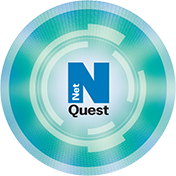Cloud services are a game-changer for small- and medium-sized businesses (SMBs). They offer cost-effective and powerful IT solutions that empower SMBs to compete with larger enterprises.
As a business owner, it’s important to understand the different types of cloud services available and how they can benefit your business. How familiar are you with cloud services for SMBs? Take this quiz to test your knowledge.
Question 1: What is cloud storage?
A. Storing data on physical devices, such as hard drives and USB flash drives
B. Storing data in your company’s on-site server
C. Storing data on remote servers accessible via the internet
Correct answer: C. Storing data on remote servers accessible via the internet
Cloud storage eliminates the limitations of traditional physical storage methods, allowing you to store your data in the cloud and access it from anywhere at any time. With cloud storage, you do not have to purchase or maintain your own hardware; you simply store and access your data on remote servers hosted by a provider. This means you can pay for only the storage space you use and easily add or remove storage capacity depending on your needs.
Question 2: What is cloud backup?
A. Making copies of files and storing them on external hard drives
B. Automatically backing up files and databases to the cloud
C. Transferring data from one cloud service to another
Correct answer: B. Automatically backing up files and databases to the cloud
Cloud backup is a reliable way to protect your important data from loss or corruption. It works by creating copies of your data and storing them in a remote server environment. This keeps your data safe even if your computer or device is damaged, lost, or stolen. You can simply restore your data from the cloud on a different computer or device and pick up right where you left off. This can save you a lot of time and money, as you won't need to recreate your data from scratch.
Question 3: What is cloud hosting?
A. Hosting websites on dedicated physical servers
B. Hosting websites on virtual servers within a connected network
C. Hosting websites on multiple devices for redundancy
Correct answer: B. Hosting websites on virtual servers within a connected network
Cloud hosting and traditional web hosting are two different ways to deliver websites to users. With traditional web hosting, your website is stored on a single physical server. If that server goes down, your website will be unavailable to users. With cloud hosting, your website is stored on many virtual servers that are spread across different locations. If one server becomes inaccessible, your website will still be available on the other servers. This provides greater uptime and reliability for your website.
Question 4: What are some advantages of cloud hosting?
A. Limited bandwidth and higher costs
B. Reduced downtime, pay-as-you-go pricing, and scalability
C. Inflexible resources and longer development times
Correct answer: B. Reduced downtime, pay-as-you-go pricing, and scalability
Cloud hosting offers plenty of advantages over traditional hosting, including:
- Reduced downtime: Cloud providers have multiple data centers located around the world, meaning your site can be served from multiple locations, reducing the risk of downtime.
- Pay-as-you-go pricing: With cloud hosting services, you pay only for the resources you use. This can save you money, especially during periods of low traffic.
- Scalability: With cloud hosting, you can easily scale your resources up or down to meet your needs. This is ideal for websites with fluctuating traffic levels.
Quiz: How well do you know basic cybersecurity lingo?
Question 5: What is the purpose of Microsoft Teams, Asana, Trello, Basecamp, and other similar apps?
A. Improving network security
B. Facilitating teamwork and task management
C. Providing help desk services
Correct answer: B. Facilitating teamwork and task management
Microsoft Teams, Asana, Trello, and Basecamp are collaboration tools that help teams work together more efficiently. These software solutions provide a variety of features that make it easy to create and track tasks, share files, and communicate with team members.
Question 6: What is the key benefit of cloud-based communications tools?
A. Unlimited free trials
B. Integration with social networks
C. Accessible across various devices
Correct answer: C. Accessible across various devices
Cloud-based communications tools offer seamless communication and collaboration options, allowing SMBs to connect with team members and clients from different locations and devices.
How did you do?
5–6 correct answers: Great job! You have a solid understanding of cloud services for SMBs.
3–4 correct answers: You're on the right track, but there's more to learn. Consider exploring these tools further.
0–2 correct answer: Don't worry, there's always room for improvement. Take the opportunity to discover the benefits of cloud services for your SMB.
Looking for the best cloud services to help your business grow? NetQuest’s IT experts can help you choose the right cloud solutions for your specific needs. Get in touch with us today.


